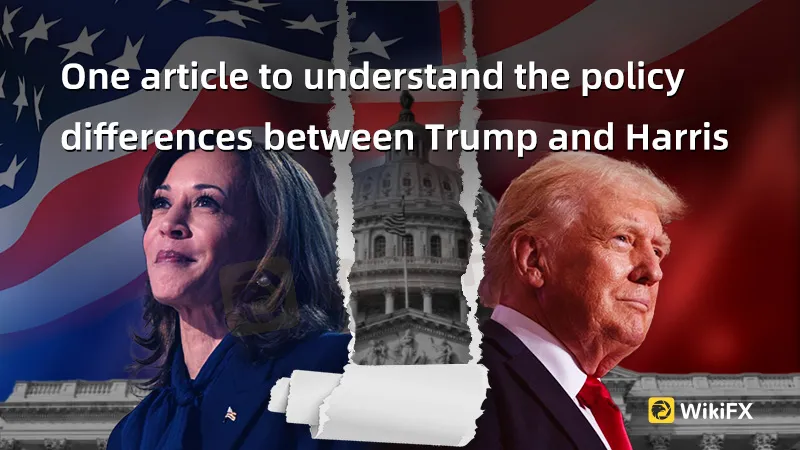One article to understand the policy differences between Trump and Harris
abstrak:In the current political climate, understanding the policy differences between the main candidates has become increasingly important. As the 2024 U.S. presidential election approaches, the intense rivalry between Trump and Harris not only influences voters' decisions but also determines the future direction of the nation at a crucial time. With voting imminent, voters face two distinctly different governance philosophies and policy directions that impact not only U.S. domestic and foreign policy but also profoundly affect the global investment landscape.

In the current political climate, understanding the policy differences between the main candidates has become increasingly important. As the 2024 U.S. presidential election approaches, the intense rivalry between Trump and Harris not only influences voters' decisions but also determines the future direction of the nation at a crucial time. With voting imminent, voters face two distinctly different governance philosophies and policy directions that impact not only U.S. domestic and foreign policy but also profoundly affect the global investment landscape.
This article will systematically compare and analyze the main positions of Harris and Trump across different policy areas, revealing their significant differences on key issues and helping investors gain insights into future investment opportunities and risks.
Foreign and Border Policy
- NATO and the Russia-Ukraine Conflict: Trump hopes to mediate to ease the situation in Europe, striving to end the Russia-Ukraine war. In contrast, Harris firmly supports NATO and Ukraine, emphasizing the maintenance of regional security and stability.
- Immigration Policy: Trump takes a hard stance on illegal immigration and plans to increase deportations; Harris seeks to reform asylum policies and expand legal immigration.
Economic and Technology Policy
- Trade Policy: Trump advocates for a 10% tariff on imports from certain Asian countries, maintaining a consistently tough trade stance. Harris, while upholding existing tariffs, proposes additional tariffs on some goods.
- Energy Policy: Trump supports fossil fuels, opposes renewable energy, and seeks to lift restrictions on U.S. energy production. Harris aims to vigorously develop renewable energy, eliminate subsidies for oil and gas, and expand the clean energy workforce.
- Infrastructure Investment: Both candidates express support for infrastructure investment to drive economic growth.
- Tax Policy: Trump plans to make the relevant provisions of the Tax Cuts and Jobs Act permanent and eliminate the tax on tips; Harris advocates for higher tax rates on the wealthy and increased tax relief for children and low-income groups to achieve a fairer tax system.
- Minimum Wage: Harris supports raising the federal minimum wage to $15/hour; Trump opposed wage increases during his 2020 campaign to protect small businesses but has not made a recent statement.
- Manufacturing: Both support bringing manufacturing jobs back to boost the domestic economy.
- Digital Currency: Trump fully supports digital currencies, advocating for the removal of government regulation; Harris has not yet stated a position but has had contact with the cryptocurrency sector.
- Artificial Intelligence: Trump supports open AI development and maintaining a technological advantage over China; Harris proposes establishing a balanced regulatory framework to address potential biases, privacy issues, and social impacts, ensuring technology benefits all sectors of society.
- Independence of Monetary Policy: Trump believes the president should participate in the Federal Reserve's decision-making process, while Harris emphasizes the independence of the Federal Reserve.
Cost of Living Policies
- Daily Costs: Trump aims to alleviate burdens on citizens by lowering energy and everyday goods and services costs; Harris advocates against unfair mergers by large food companies to prevent “price gouging” in food and groceries.
- Housing: Trump believes housing costs should be reduced by lowering inflation and opening federal lands for new construction, alongside tax incentives for first-time homebuyers. Harris plans to provide tax incentives for affordable housing construction, invest $40 billion in housing development, and commit to building 3 million new homes in four years, offering $25,000 in down payment assistance for first-time buyers.
- Healthcare: Trump supports increasing market competition and sought to repeal the Affordable Care Act during his tenure; Harris advocates for strengthening federal subsidies for the Affordable Care Act, expanding healthcare coverage, and supporting states in eliminating medical debt.
- Drug Prices: Trump supports expanding prescription drug options by promoting competition; Harris authorizes negotiations to reduce drug costs and further promote transparent competition.
Through the comparison of these policies, it is clear that Trump and Harris have fundamental disagreements on several key issues. These differences not only reflect the candidates' divergent governance philosophies but also provide voters with clear criteria for their choices in the upcoming election.
At this historic moment, voters' decisions will directly impact the future direction and policies of the nation, and these changes will undoubtedly have profound effects on investors' decisions. In the next four years, the U.S. will face numerous complex challenges, and voters' choices will not only determine the country's fate but could also reshape global financial markets.
Investors should carefully analyze the potential impacts of these policies on their investment portfolios, seizing opportunities presented by the changing times to make informed choices for their investment strategies in this pivotal election.
Tensions are about to escalate, so get ready to embrace this historic moment!

Broker ng WikiFX
Exchange Rate
